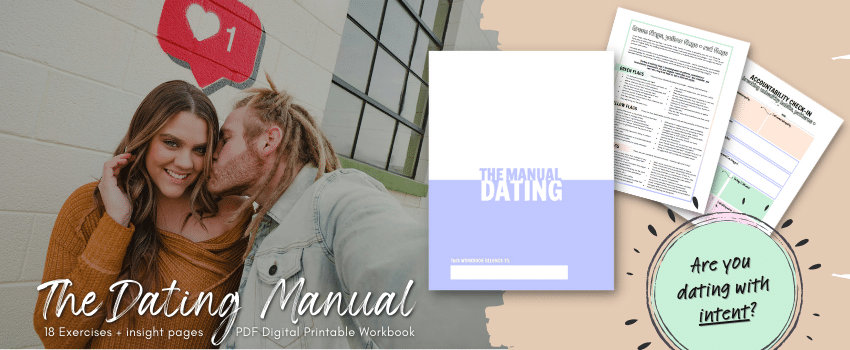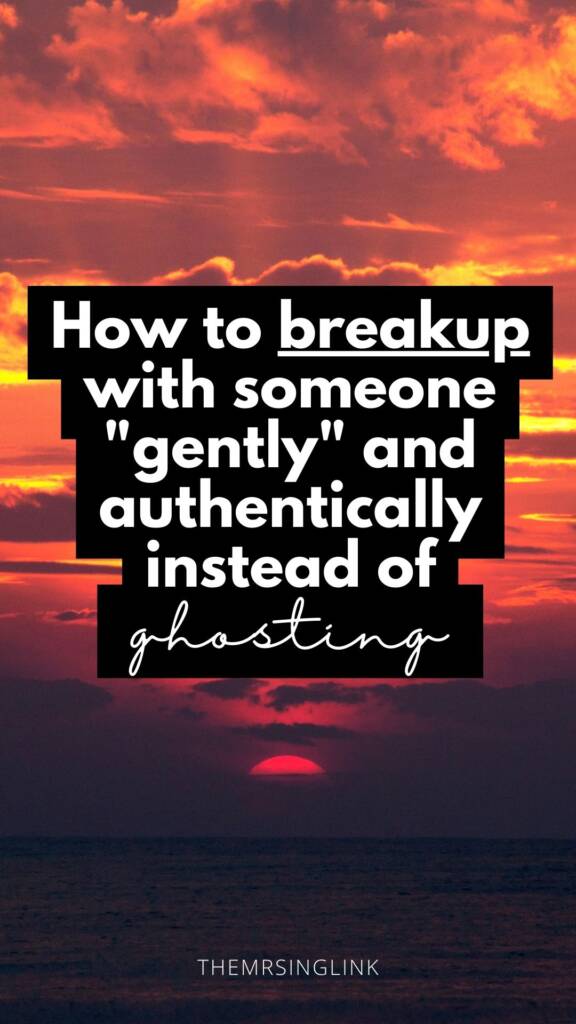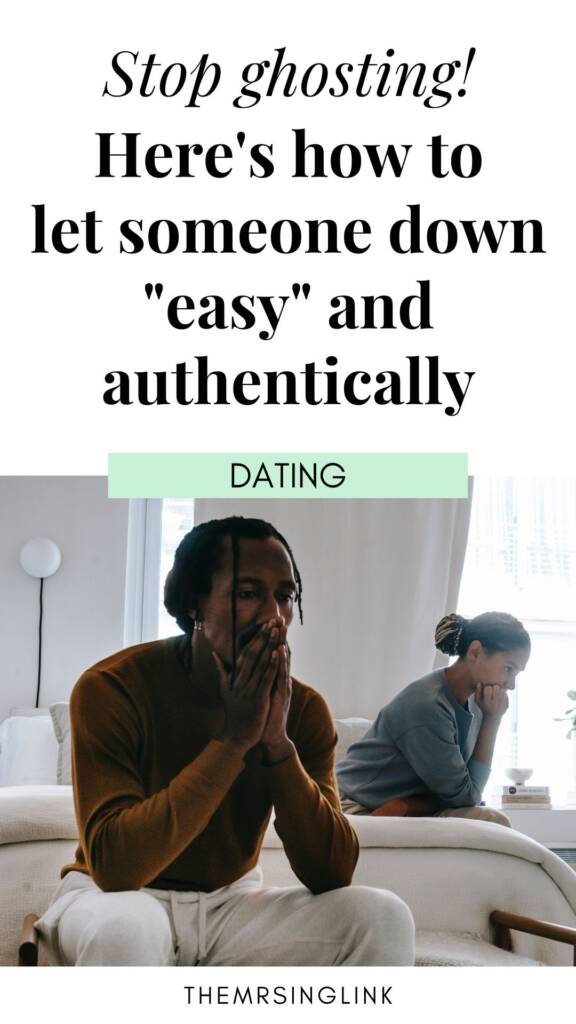
Or, rather…gently and sincerely. Regardless, severing the cord and letting someone down with the uncomfortable “truth” won’t always be a cakewalk. TBH, if you’re not prepared to face rejection…seriously, don’t date. And the lesson here is how to let someone down instead of ghosting them.
Relationships shouldn’t be like walking the tight rope. Avoiding or running away from what makes us uncomfortable only reinforces that very dynamic. We’re just too prideful, shameful and afraid to face discomfort, let alone to tough it out and have those inevitable and uncomfortable conversations with people.
In the name of kindness, we’re convinced this requires coddling or affirmation without firmness. Newsflash: you can be kind and firm.
Rejection, in the dating process, was never meant to be something taken so…personally. If we’re the ones doing the rejecting…why are we having such a difficult time, as if we are the ones being rejected?
If we can relate to being rejected, are we in denial of rejection being a normal part of life? Are we taking rejection, again, too personally to the point of constantly viewing life as always unfairly happening to us? If so, how will we ever cope?
What we unpack in this post:
I sometimes wonder if ghosting is so widespread simply because we’re too afraid to face both sides of rejection, and that the easiest way to cope is to avoid facing it at all costs.
Breaking it off with someone, or letting them down (clearly, sincerely and honestly) doesn’t suddenly make you a bad, “hurtful” or unloving person. In fact, doing what’s right doesn’t always mean doing what’s easy, especially for ourselves and others.
We tend to think stroking the heartstrings of someone (as if to lullaby them to sleep) through pretty or vague wording is kind, meanwhile it’s deceptive and inauthentic, and it’s intent is only to pat ourselves on the back. I would argue that’s just as harmful as ghosting.
How to let someone down instead of ghosting
![How to let someone down easy instead of ghosting | Truth bomb drop: if you're not prepared to possibly "hurt someone's feelings" by turning them down, don't date. Instead of toying with someone's heartstrings through "pretty" words, playing it off in hopes they just eventually "get the hint", or completely going "ghost" by avoidance, in order to avoid facing the emotional [consequential] aftermath, here are several ways you can let someone down authentically and genuinely "nice". #dating #onlinedating | theMRSingLink LLC](https://themrsinglink.com/wp-content/uploads/2022/02/how-to-let-someone-down-nicely-instead-of-ghosting-breaking-up-in-dating-and-relationships-pin-1-683x1024.jpg)
Focus more on respect than self-preservation
These days, preserving or protecting our peace is a hot topic, especially in the self-help world and self-love movement. While I understand this, there are times this can be misused. What happens if we continually justify avoiding discomfort in the name of self-preservation?
Rejection sucks. Rejecting also sucks. There’s no feel good either way, and having to do the rejecting isn’t designed to be easy because we can’t control how the other person will feel, react or respond.
Otherwise, we might question how comfortable we are afflicting or invalidating pain in others. Letting someone down often requires us to bite the bullet.
When we focus on self-preservation, we’re simply expecting the other person to take rejection *well*. But when the focus is on respect, we’re allowing space for a person to experience their feelings while giving them [the respect] they deserve, regardless of how we feel.
For lack of better words, there’s respect in allowing someone to experience rejection in the manner they receive it, even if it means we go through a little discomfort.
Make it fair and “honorable”
Would you prefer someone to break it off with you over a quick yet drawn-out text or in person? How about just not responding to you at all and disappearing from reality as you know it?
Ask yourself how you have handled letting people down in the past, in comparison to how people have let you down. Was it fair and “honorable” – meaning, did you have the other person’s best interest at heart apart from your own? Do you think they had yours?
Breaking off a years-long relationship by Facebook messenger, out of the blue in my late teens is (to this day) one of my biggest breakup regrets. I did him dirty simply because I was ashamed that I was ready to move on in the midst of his commitment to me. To make matters worse, he replied back, and I went above and beyond to avoid reading it and ultimately deleted it.
That was far from fair and honorable, but I was more concerned with a smooth transition (for me) than how it would ultimately affect him.
If you went through the “trouble” of getting to know the person on a fairly deep and intimate level, at least give them the honorable “death” they deserve, even if it means having to endure opposition.
At this point, that ought to be anticipated, not manipulated in such a way that only serves to benefit ourselves and our outcome.

Don’t confuse ambiguity with “kindness”
“Kindness” doesn’t mean telling someone all the things they want to hear, let alone what isn’t all true as to “save their feelings”. The word “nice”, as we already know, is a grimy word for sugar-coating disingenuity. “Nice” isn’t helpful, either, because it’s ambiguous.
Being vague is not being kind. When you compromise clarity, you encourage mixed messages and false hope. What does ambiguity look or sound like when letting someone down? Ambiguity could be saying something that sounds loving (and it may be absolutely true) but is not actually helpful or beneficial. Some examples of this in a breakup, or when letting someone down is saying,
“I still care about you/love you,”,
“We can still be friends/I really want to stay friends,”,
“This is so hard for me – you have no idea,“,
“You mean so much to me/I don’t deserve you,”,
“…maybe down the road/who knows what the future holds.”
When letting someone down, typically the compass points to ourselves, how we feel, and how we want to be perceived. While we may genuinely care about not hurting the other person, is making the focus on ourselves doing the best job of doing just that (preventing or alleviating them from hurt)?
If my husband were to ask for a divorce and say to me, “…but I still love you/I care about you,” the last thing I’ll be is relieved and somehow pain-free knowing that he “still Loves me” in that moment.
Kindness also doesn’t mean staying in touch or giving false hope. This includes instances where the person needs or requests ongoing closure – there comes a point when giving into this tactic is no longer out of kindness when you have already made your decision to part ways abundantly clear.
Ambiguity only gives a person more reason to believe they have a chance to rectify the situation.
Being honest doesn’t mean being heartless
Breakups often make us cower because inevitably nothing “good” comes of it, unless the feeling just happens to be mutual. Being let down or letting someone down also comes with the inevitable, dreaded and consequential negative emotions surrounding it. Shame, sadness, grief, confusion, frustration, betrayal and guilt.
When breaking it off with someone, it’s natural to want to avoid seeming like the bad-guy or “heartbreaker”. That doesn’t change the fact that dating is a learning curve of lessons (to hopefully do better or different the next time around).
So when we’re told that honesty is the best policy, that is with knowing that honesty may ultimately hurt someone’s feelings. Meaning, sometimes the truth *hurts*, regardless of your intent and choice of words.
Yet being honest doesn’t equate to being heartless, especially if you’re comparing someone who decides to ghost instead. To be heartless is to be soul-less or mean-spirited, which means indecency is at the forefront. It is more than possible to be both honest and firm while still kind and loving.
[Related Read: 5 Reasons the guy you’re dating suddenly ghosted you]
Refrain from “matching” their negative energy
Shocker – nobody actually likes being rejected or broken up with. And no one clearly enjoys doing the rejecting or breaking up with, either. Introducing…*ghosting*, the CTRL+ALT+DEL to modern-day dating and relationship problems.
People react to being broken up with differently. Some take it fairly well, some tend to hide or internalize their pain, and then there are those with a more combative, over-reaction. Regardless, how we experience rejection can be a trigger behind the burden of doing the letdown.
We act as if opposition, unpleasantness or dissatisfaction, as a response to rejection or heartbrokenness, is worst case scenario or not a contending option. Honestly, we just don’t want to someone’s hurt feelings to jeopardize our good intent. Right?
How guilty are we of responding to opposition with opposition? Someone took rejection too personal, which then makes us take their reaction too personal.
The real question is why we would expect someone to receive rejection with acknowledgment of good intent, honesty, clarity and kindness? To make it make sense, I rarely think someone initially responds to rejection with, “Thank you for being honest, clear, and kind. I can tell this was coming from a place of Love in your heart.“
In turn, how likely are we to match a person’s pain in the wake of rejection? For instance, you let someone down and they become unexpectedly confused and frustrated, resulting in saying some things they shouldn’t or didn’t mean. After approaching the letdown with kindness, compassion and honesty, the things they said also trigger you to respond with frustration and to say things that unnecessarily continue to further escalate the situation. That is an example of “matching negative energy with negative energy”.
Being broken up with is hard, and doing the breaking up with is a different hard, which means we should be able to separate the feelings of others without it becoming an affliction to our own.
Stop trying to control their response or reaction
Ultimately our go-to is what’s easier on ourselves, which means trying to make the rejection process easier on them. Somehow, we think we can control how someone feels and therefore responds…even though we’re not the one being broken up with (or rejected, let down).
“How can you be this upset?“, “You should be grateful that I came clean about seeing someone else,” or “I’ve been nothing but good to you – don’t I deserve credit for that?” Aren’t these the intrusive statements and questions we might conjure up in our heads, or for some have said aloud?
Except someone else’s feelings and their response are not yours to decide. For as long as you choose to allow others into your life, you’re accepting the risk of unfavorable outcomes (or simply not getting the outcome you anticipated). That includes the less-than-ideal response to letting someone down.


